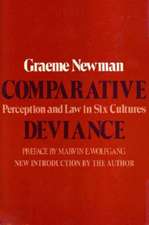Punishment and Social Structure
Editat de Otto Kirchheimeren Limba Engleză Hardback – 28 sep 2017
| Toate formatele și edițiile | Preț | Express |
|---|---|---|
| Paperback (1) | 468.36 lei 43-57 zile | |
| Taylor & Francis – 30 ian 2003 | 468.36 lei 43-57 zile | |
| Hardback (1) | 1109.18 lei 43-57 zile | |
| Taylor & Francis – 28 sep 2017 | 1109.18 lei 43-57 zile |
Preț: 1109.18 lei
Preț vechi: 1352.65 lei
-18% Nou
Puncte Express: 1664
Preț estimativ în valută:
212.24€ • 222.16$ • 176.65£
212.24€ • 222.16$ • 176.65£
Carte tipărită la comandă
Livrare economică 31 martie-14 aprilie
Preluare comenzi: 021 569.72.76
Specificații
ISBN-13: 9781138531284
ISBN-10: 1138531286
Pagini: 324
Dimensiuni: 152 x 229 x 19 mm
Greutate: 0.45 kg
Ediția:1
Editura: Taylor & Francis
Colecția Routledge
Locul publicării:Oxford, United Kingdom
ISBN-10: 1138531286
Pagini: 324
Dimensiuni: 152 x 229 x 19 mm
Greutate: 0.45 kg
Ediția:1
Editura: Taylor & Francis
Colecția Routledge
Locul publicării:Oxford, United Kingdom
Cuprins
I. INTRODUCTION II. SOCIAL CONDITIONS AND PENAL ADMINISTRATION IN THE LATER MIDDLE AGES III. MERCANTILISM AND THE RISE OF IMPRISONMENT V. DEVELOPMENTS IN CRIMINAL THEORY AND LAW DURING THE AGE OF ENLIGHTENMENT VI. Social AND PENAL CONSEQUENCES OF THE INDUS[1]TRIAL REVOLUTION VII. THE ABOLITION OF TRANSPORTATION VIII. THE FAlLURE OF SoLITARY CONFINEMENT IX. MODERN PRISON REFORM AND ITs LIMITS X. THE FINE IN RECENT PENAL PRACTICE XI. NEW TRENDS IN PENAL PoLICY UNDER FASCISM XII. PENAL PoLICY AND CRIME RATE XIII. CONCLUSION
Descriere
Why are certain methods of punishment adopted or rejected in a given social situation? To what extent is the development of penal methods determined by basic social relations? The answers to these questions are complex, and go well beyond the thesis that institutionalized punishment is simply for the protection of society


















